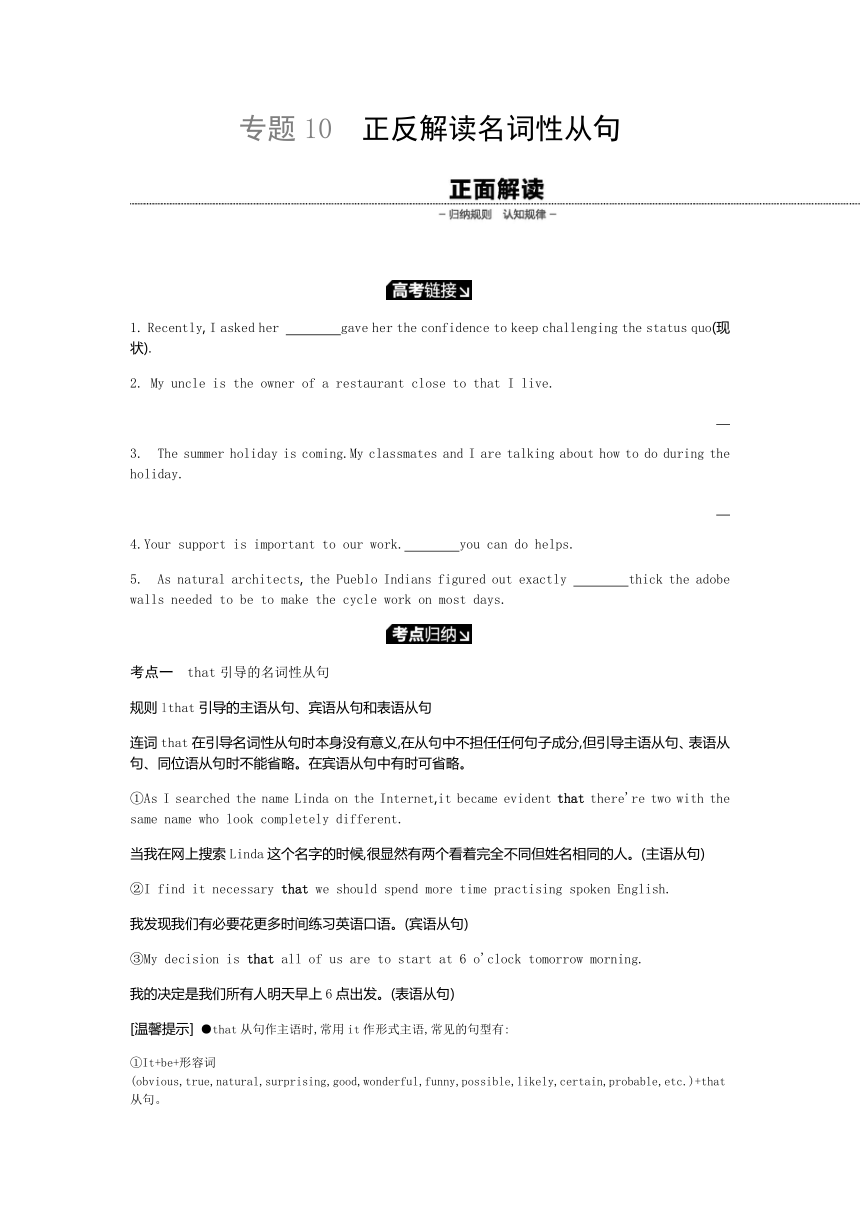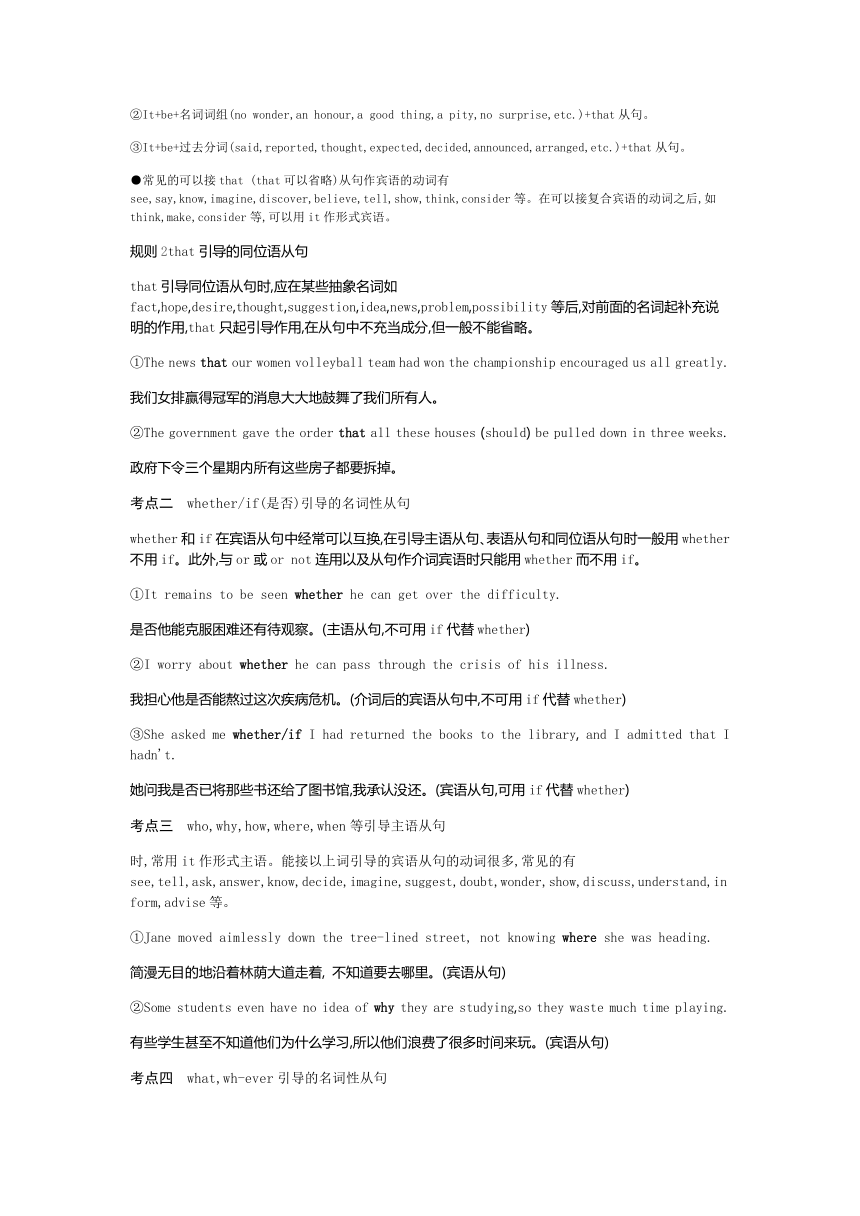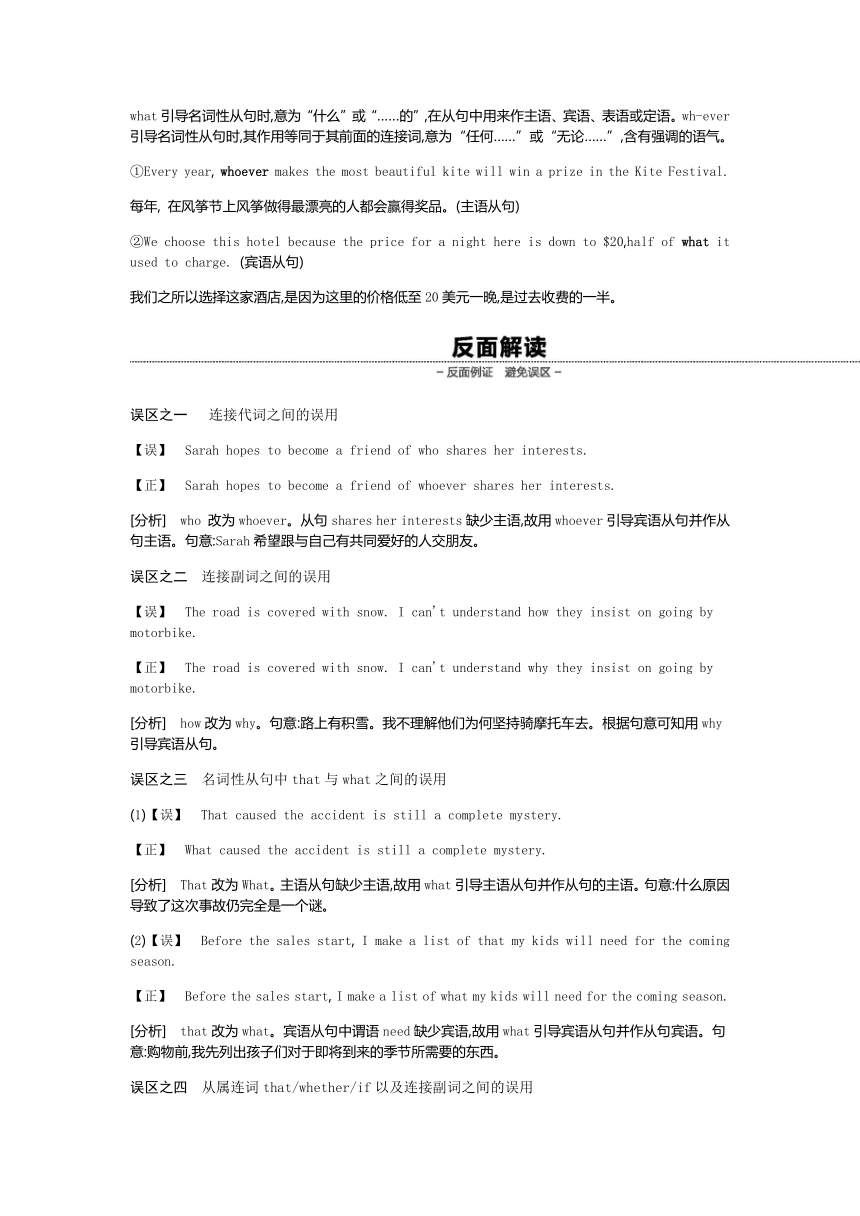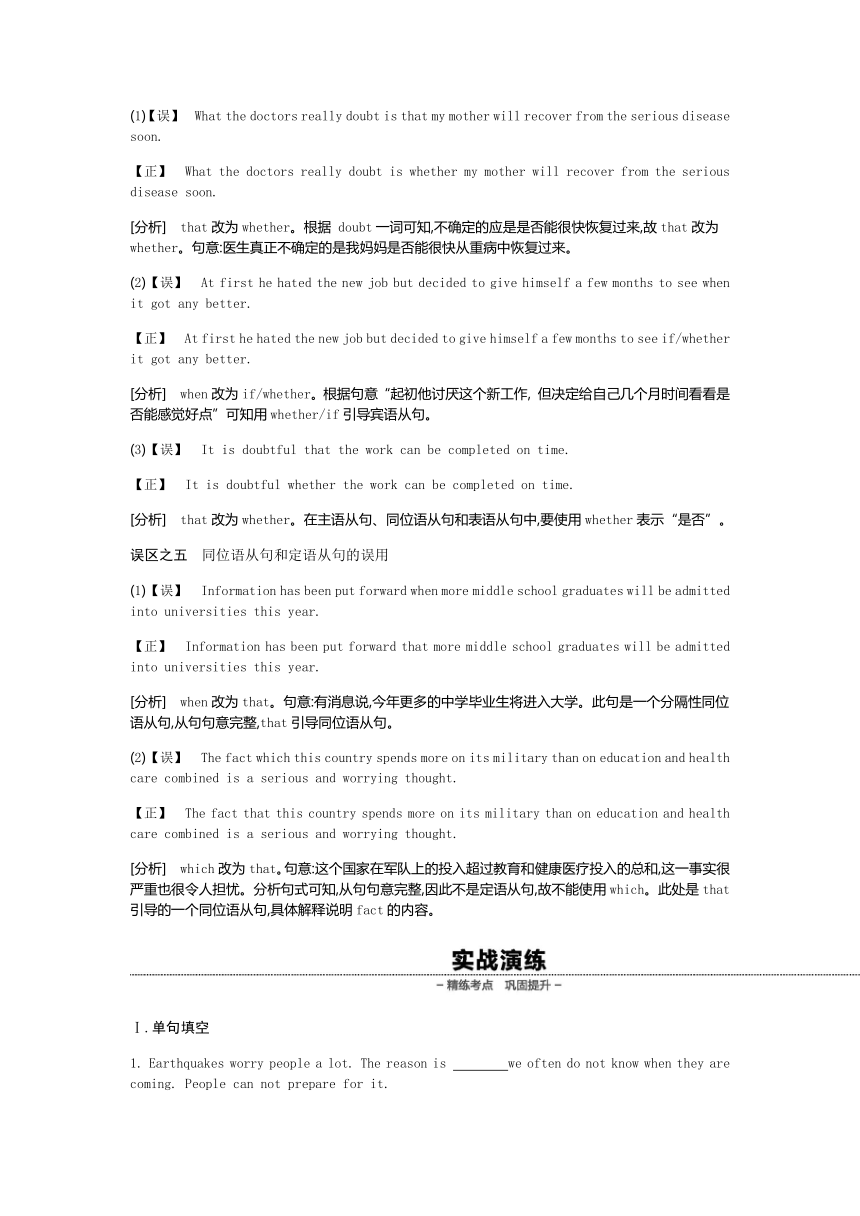高考英语复习:语法专题 专题10 正反解读名词性从句学案(含答案)
文档属性
| 名称 | 高考英语复习:语法专题 专题10 正反解读名词性从句学案(含答案) |  | |
| 格式 | docx | ||
| 文件大小 | 152.5KB | ||
| 资源类型 | 教案 | ||
| 版本资源 | 通用版 | ||
| 科目 | 英语 | ||
| 更新时间 | 2023-05-02 21:15:55 | ||
图片预览




文档简介
专题10 正反解读名词性从句
1. Recently, I asked her gave her the confidence to keep challenging the status quo(现状).
2. My uncle is the owner of a restaurant close to that I live.
3. The summer holiday is coming.My classmates and I are talking about how to do during the holiday.
4.Your support is important to our work. you can do helps.
5. As natural architects, the Pueblo Indians figured out exactly thick the adobe walls needed to be to make the cycle work on most days.
考点一 that引导的名词性从句
规则1that引导的主语从句、宾语从句和表语从句
连词that在引导名词性从句时本身没有意义,在从句中不担任任何句子成分,但引导主语从句、表语从句、同位语从句时不能省略。在宾语从句中有时可省略。
①As I searched the name Linda on the Internet,it became evident that there're two with the same name who look completely different.
当我在网上搜索Linda这个名字的时候,很显然有两个看着完全不同但姓名相同的人。(主语从句)
②I find it necessary that we should spend more time practising spoken English.
我发现我们有必要花更多时间练习英语口语。(宾语从句)
③My decision is that all of us are to start at 6 o'clock tomorrow morning.
我的决定是我们所有人明天早上6点出发。(表语从句)
[温馨提示] ●that从句作主语时,常用it作形式主语,常见的句型有:
①It+be+形容词(obvious,true,natural,surprising,good,wonderful,funny,possible,likely,certain,probable,etc.)+that从句。
②It+be+名词词组(no wonder,an honour,a good thing,a pity,no surprise,etc.)+that从句。
③It+be+过去分词(said,reported,thought,expected,decided,announced,arranged,etc.)+that从句。
●常见的可以接that (that可以省略)从句作宾语的动词有see,say,know,imagine,discover,believe,tell,show,think,consider等。在可以接复合宾语的动词之后,如think,make,consider等,可以用it作形式宾语。
规则2that引导的同位语从句
that引导同位语从句时,应在某些抽象名词如fact,hope,desire,thought,suggestion,idea,news,problem,possibility等后,对前面的名词起补充说明的作用,that只起引导作用,在从句中不充当成分,但一般不能省略。
①The news that our women volleyball team had won the championship encouraged us all greatly.
我们女排赢得冠军的消息大大地鼓舞了我们所有人。
②The government gave the order that all these houses (should) be pulled down in three weeks.
政府下令三个星期内所有这些房子都要拆掉。
考点二 whether/if(是否)引导的名词性从句
whether和if在宾语从句中经常可以互换,在引导主语从句、表语从句和同位语从句时一般用whether不用if。此外,与or或or not连用以及从句作介词宾语时只能用whether而不用if。
①It remains to be seen whether he can get over the difficulty.
是否他能克服困难还有待观察。(主语从句,不可用if代替whether)
②I worry about whether he can pass through the crisis of his illness.
我担心他是否能熬过这次疾病危机。(介词后的宾语从句中,不可用if代替whether)
③She asked me whether/if I had returned the books to the library, and I admitted that I hadn't.
她问我是否已将那些书还给了图书馆,我承认没还。(宾语从句,可用if代替whether)
考点三 who,why,how,where,when等引导主语从句
时,常用it作形式主语。能接以上词引导的宾语从句的动词很多,常见的有see,tell,ask,answer,know,decide,imagine,suggest,doubt,wonder,show,discuss,understand,inform,advise等。
①Jane moved aimlessly down the tree-lined street, not knowing where she was heading.
简漫无目的地沿着林荫大道走着, 不知道要去哪里。(宾语从句)
②Some students even have no idea of why they are studying,so they waste much time playing.
有些学生甚至不知道他们为什么学习,所以他们浪费了很多时间来玩。(宾语从句)
考点四 what,wh-ever引导的名词性从句
what引导名词性从句时,意为“什么”或“……的”,在从句中用来作主语、宾语、表语或定语。wh-ever引导名词性从句时,其作用等同于其前面的连接词,意为“任何……”或“无论……”,含有强调的语气。
①Every year, whoever makes the most beautiful kite will win a prize in the Kite Festival.
每年, 在风筝节上风筝做得最漂亮的人都会赢得奖品。(主语从句)
②We choose this hotel because the price for a night here is down to $20,half of what it used to charge. (宾语从句)
我们之所以选择这家酒店,是因为这里的价格低至20美元一晚,是过去收费的一半。
误区之一 连接代词之间的误用
【误】 Sarah hopes to become a friend of who shares her interests.
【正】 Sarah hopes to become a friend of whoever shares her interests.
[分析] who 改为whoever。从句shares her interests缺少主语,故用whoever引导宾语从句并作从句主语。句意:Sarah希望跟与自己有共同爱好的人交朋友。
误区之二 连接副词之间的误用
【误】 The road is covered with snow. I can't understand how they insist on going by motorbike.
【正】 The road is covered with snow. I can't understand why they insist on going by motorbike.
[分析] how改为why。句意:路上有积雪。我不理解他们为何坚持骑摩托车去。根据句意可知用why引导宾语从句。
误区之三 名词性从句中that与what之间的误用
(1)【误】 That caused the accident is still a complete mystery.
【正】 What caused the accident is still a complete mystery.
[分析] That改为What。主语从句缺少主语,故用what引导主语从句并作从句的主语。句意:什么原因导致了这次事故仍完全是一个谜。
(2)【误】 Before the sales start, I make a list of that my kids will need for the coming season.
【正】 Before the sales start, I make a list of what my kids will need for the coming season.
[分析] that改为what。宾语从句中谓语need缺少宾语,故用what引导宾语从句并作从句宾语。句意:购物前,我先列出孩子们对于即将到来的季节所需要的东西。
误区之四 从属连词that/whether/if以及连接副词之间的误用
(1)【误】 What the doctors really doubt is that my mother will recover from the serious disease soon.
【正】 What the doctors really doubt is whether my mother will recover from the serious disease soon.
[分析] that改为whether。根据 doubt一词可知,不确定的应是是否能很快恢复过来,故that改为whether。句意:医生真正不确定的是我妈妈是否能很快从重病中恢复过来。
(2)【误】 At first he hated the new job but decided to give himself a few months to see when it got any better.
【正】 At first he hated the new job but decided to give himself a few months to see if/whether it got any better.
[分析] when改为if/whether。根据句意“起初他讨厌这个新工作, 但决定给自己几个月时间看看是否能感觉好点”可知用whether/if引导宾语从句。
(3)【误】 It is doubtful that the work can be completed on time.
【正】 It is doubtful whether the work can be completed on time.
[分析] that改为whether。在主语从句、同位语从句和表语从句中,要使用whether表示“是否”。
误区之五 同位语从句和定语从句的误用
(1)【误】 Information has been put forward when more middle school graduates will be admitted into universities this year.
【正】 Information has been put forward that more middle school graduates will be admitted into universities this year.
[分析] when改为that。句意:有消息说,今年更多的中学毕业生将进入大学。此句是一个分隔性同位语从句,从句句意完整,that引导同位语从句。
(2)【误】 The fact which this country spends more on its military than on education and health care combined is a serious and worrying thought.
【正】 The fact that this country spends more on its military than on education and health care combined is a serious and worrying thought.
[分析] which改为that。句意:这个国家在军队上的投入超过教育和健康医疗投入的总和,这一事实很严重也很令人担忧。分析句式可知,从句句意完整,因此不是定语从句,故不能使用which。此处是that引导的一个同位语从句,具体解释说明fact的内容。
Ⅰ.单句填空
1. Earthquakes worry people a lot. The reason is we often do not know when they are coming. People can not prepare for it.
2. Success partially depends on you have the patience to do simple things perfectly.
3. To our astonishment, we saw a light and some people in a cabin. Jim was too frightened to go on but I felt curious, wondering was happening.
4. Finally, keep in mind there are many things that can't be learnt immediately, and never be frustrated when you fail in one or two exams.
5. With an optimistic attitude and a strong will, we can overcome difficulties we might meet with and achieve our goals.
6. Recently, a new research has suggested the possibility in a popular magazine pleasant smells might reduce pain.
7. Mr White is opposed to repairing the old building, and that's I don't agree.
8. It is obvious the local government can do to protect the environment for the future generations.
9. The problem is one less hour of sleep is not equal to an extra hour of achievement.
10. The father and his son got lost in the mountain and they had to eat food they could find there.
11. His favourite food is fried snacks and soft drinks. It is no surprise losing weight is just his dream.
12. It remains to be seen the newly formed committee's policy can be put into practice.
13. Now it occurred to him his farm had much potential and that the death of the cow was a bit of luck.
14.The practical suggestion came from the representatives the new rule be adopted.
15. They would appreciate it, to be frank, the goods could be delivered as soon as possible.
Ⅱ.单句改错
1.His promise which he would give away half of the year's income to the disabled turned out to be a lie.
2.Intelligence, perseverance and confidence are that it takes to make a good scientist.
3.We are thinking about whom can be admitted into our club. The number of members is limited.
4.At the evening party the host said who was able to solve the riddle could get a nice present as a reward.
5.Whether we will do is to leave a note to tell Mum we will be back late.
Ⅲ.语法填空
In southern Portugal, scientists from the University of Edinburgh have recently found some fossil (化石) remains of a 1. (previous) unknown species (物种) of a crocodile-like “super salamander ”.
The species could grow up to six feet in 2. (long). It lived in lakes and rivers. It was part of a wider group of primitive amphibians (两栖动物) 3. were widespread at the time but died out in the end. They are the ancestors of modern amphibians such as frogs. They are believed by scientists 4. (live) at the same time the dinosaurs began their rule.
Steve Brusatte led the study. He said the new species had 5. (hundred) of sharp teeth. It looks somehow “strange” 6. (compare) to anything today.
Feeding mainly 7. fish, it was at the top of the food chain. But it's also 8. danger for newly appeared dinosaurs and mammals that moved too near the water.
The team says the finding confirms that this group of amphibians lived in a 9. (diverse) geographic area than people had thought.
The dig began in 2009 and took several years. The “super salamander” bones 10. (discover) in a half-metre thick layer of rock in a hillside. The team hopes to raise funds to continue exploring the site.
专题10 正反解读名词性从句
【高考链接】
1.what 从上下文结构可知,此处需要what引导的宾语从句,故填what。
2.that改为where 由句子结构可知,介词to之后为宾语从句。从句谓语是不及物动词live。故用where引导。
3.how改为what 第二句句意:我和同学们正在谈论假期里做什么。
4.Whatever 句意:你的支持对我们的工作很重要,无论你做什么都会有帮助。从句动词do需要宾语,且所填词引导主语从句,故用Whatever。
5.how 分析句子结构可知,这是一个宾语从句。根据形容词thick及结构可知这里的意思是印第安人要算出土坯墙的确切厚度。故填how。
【实战演练】
Ⅰ.单句填空
1.that 句意:地震让人们很担忧。原因是我们通常不知道它们什么时候发生。人们没法做准备。设空处引导表语从句,从句的结构和意义完整,所以用that引导。
2.whether 句意:成功部分取决于你是否有耐心把简单的事情做得完美。设空处引导宾语从句,作介词on的宾语,意为“是否”,故填whether。
3.what 句意:令我们惊讶的是,我们看到在小屋内有一束光和一些人。吉姆太害怕了,不敢继续往前,但是我觉得很好奇,想知道发生了什么事。设空处引导宾语从句,并在从句中作主语,表示事物,故用what引导。
4.that 动词短语keep in mind后是一个宾语从句,且从句中不缺少成分,因此用that引导。
5.whatever 句意:带着乐观的态度和强烈的愿望,我们能够克服可能遇到的任何困难,取得成功。通过分析句子可知,overcome后为宾语从句,动词短语meet with后缺少宾语,再结合句意可知用whatever修饰名词difficulties引导宾语从句。
6.that 句意:最近,在一本流行杂志中,有一项新的研究表明好闻的气味有可能减少疼痛。设空处引导同位语从句,对possibility进行解释说明,且从句中不缺成分,意义完整,故填that。
7.where 句意:怀特先生反对维修那座旧建筑,而那正是我不同意的地方。设空处引导表语从句,从句中agree是不及物动词,其后不能直接接名词作宾语。故填where在从句中作状语。
8.what 句意:为了子孙后代,当地政府在保护环境方面所能做的事情是显而易见的。it为形式主语,“ the local government can do to protect the environment for the future generations”是真正的主语,该主语从句缺少宾语,且表示物,故填what。
9.that 句意:问题是少睡一小时不等同于额外一小时的成就。分析句子结构可知,is后为表语从句,从句的结构和句意完整,故填that。
10.whatever 句意:这对父子在山里迷路了,不得不吃他们在那里能找到的任何食物。whatever food意为“任何食物”,在从句中作动词find的宾语。
11.that 句意:他最喜欢的食物是油炸类小吃和软饮料。减肥只是他的梦想,这一点儿都不令人吃惊。it是形式主语,真正的主语是that引导的从句。从句中结构及句意完整,故用that引导。
12.whether/if 句意:新组建的委员会制定的政策是否能实施还有待观察。it是形式主语,设空处引导主语从句,用whether或者if,符合句意。
13.that 固定句型“it occurred to sb+that从句”表示“某人突然想到”,it是形式主语,真正的主语是that引导的从句。
14.that 句意:来自代表们的切实可行的建议是:这项新规定应该被采纳。分析句子结构可知此处考查同位语从句,说明suggestion的内容,而该从句意思非常完整,所以要用that引导。
15.if 句意:坦白地说,如果货物能够尽快被运送,他们将会非常感激。would appreciate it if…表示“如果……将不胜感激”,it作形式宾语,if引导的是宾语从句。
Ⅱ.单句改错
1.which改为that 2. that改为what 3. whom改为who
4.who改为whoever 5.Whether改为What
Ⅲ.语法填空
【文章大意】 本文介绍在葡萄牙南部,来自爱丁堡大学的科学家最近发现了一些以前不为人知的类似鳄鱼的“超级蝾螈”化石,以及对“超级蝾螈”的介绍。
1. previously 考查副词。句意:在葡萄牙南部,来自爱丁堡大学的科学家最近发现了一些以前不为人知的类似鳄鱼的“超级蝾螈”化石。根据该空后面的unknown是形容词可知,此处应该用副词修饰形容词unknown。故填previously。
2. length 考查名词。句意:这个物种可以长到6英尺长。six feet in length六英尺长,in是介词,后面跟名词,根据提示词long,可知此处应该用length。
3. that/which 考查定语从句的关系词。句意:这是一种更广泛的原始两栖动物的一部分,这种动物在当时很普遍,但最后却灭绝了。根据句意可知该空引导定语从句,并且该空在从句中作主语,先行词是物,所以用关系代词that/which。故填that/which。
4. to have lived 考查非谓语动词。句意:科学家们相信, 它们生活在恐龙开始统治的同一时期。sb/sth be believed to do…认为某人/某物做……,并且不定式的动作先于主句动作,此处要用不定式的完成式to have done,故填to have lived。
5. hundreds 考查固定搭配。句意:他说,新物种有数百颗锋利的牙齿。hundreds of数以百计的,是固定搭配。故填hundreds。
6. compared 考查非谓语动词。句意:与今天的任何事物相比,它看起来有点“奇怪”。compared to与……相比,结合句意可知此处填compared。
7. on 考查介词。句意:它主要以鱼为食,在食物链的顶端。feed on以……为食,结合句意可知此处填on。
8. a 考查冠词。句意:但对于离河太近的新出现的恐龙和哺乳动物来说,这也是一种危险的动物。该句中danger作为可数名词,表示一种危险的事物,前面加冠词,此处是泛指,应该用a。
9. more diverse 考查形容词比较级。句意:研究小组称,这一发现证实了这群两栖动物生活在一个比人们想象的更多样化的地理区域。根据than可知此处应该用形容词的比较级,结合提示词diverse可知填more diverse。
10. were discovered 考查动词时态和语态。句意:“超级蝾螈”的骨头被发现在山坡上半米厚的岩石层中。结合句意可知主语bones与discover之间是被动关系,并且主语是名词复数,结合文章时态应该用一般过去时,故填were discovered。
1. Recently, I asked her gave her the confidence to keep challenging the status quo(现状).
2. My uncle is the owner of a restaurant close to that I live.
3. The summer holiday is coming.My classmates and I are talking about how to do during the holiday.
4.Your support is important to our work. you can do helps.
5. As natural architects, the Pueblo Indians figured out exactly thick the adobe walls needed to be to make the cycle work on most days.
考点一 that引导的名词性从句
规则1that引导的主语从句、宾语从句和表语从句
连词that在引导名词性从句时本身没有意义,在从句中不担任任何句子成分,但引导主语从句、表语从句、同位语从句时不能省略。在宾语从句中有时可省略。
①As I searched the name Linda on the Internet,it became evident that there're two with the same name who look completely different.
当我在网上搜索Linda这个名字的时候,很显然有两个看着完全不同但姓名相同的人。(主语从句)
②I find it necessary that we should spend more time practising spoken English.
我发现我们有必要花更多时间练习英语口语。(宾语从句)
③My decision is that all of us are to start at 6 o'clock tomorrow morning.
我的决定是我们所有人明天早上6点出发。(表语从句)
[温馨提示] ●that从句作主语时,常用it作形式主语,常见的句型有:
①It+be+形容词(obvious,true,natural,surprising,good,wonderful,funny,possible,likely,certain,probable,etc.)+that从句。
②It+be+名词词组(no wonder,an honour,a good thing,a pity,no surprise,etc.)+that从句。
③It+be+过去分词(said,reported,thought,expected,decided,announced,arranged,etc.)+that从句。
●常见的可以接that (that可以省略)从句作宾语的动词有see,say,know,imagine,discover,believe,tell,show,think,consider等。在可以接复合宾语的动词之后,如think,make,consider等,可以用it作形式宾语。
规则2that引导的同位语从句
that引导同位语从句时,应在某些抽象名词如fact,hope,desire,thought,suggestion,idea,news,problem,possibility等后,对前面的名词起补充说明的作用,that只起引导作用,在从句中不充当成分,但一般不能省略。
①The news that our women volleyball team had won the championship encouraged us all greatly.
我们女排赢得冠军的消息大大地鼓舞了我们所有人。
②The government gave the order that all these houses (should) be pulled down in three weeks.
政府下令三个星期内所有这些房子都要拆掉。
考点二 whether/if(是否)引导的名词性从句
whether和if在宾语从句中经常可以互换,在引导主语从句、表语从句和同位语从句时一般用whether不用if。此外,与or或or not连用以及从句作介词宾语时只能用whether而不用if。
①It remains to be seen whether he can get over the difficulty.
是否他能克服困难还有待观察。(主语从句,不可用if代替whether)
②I worry about whether he can pass through the crisis of his illness.
我担心他是否能熬过这次疾病危机。(介词后的宾语从句中,不可用if代替whether)
③She asked me whether/if I had returned the books to the library, and I admitted that I hadn't.
她问我是否已将那些书还给了图书馆,我承认没还。(宾语从句,可用if代替whether)
考点三 who,why,how,where,when等引导主语从句
时,常用it作形式主语。能接以上词引导的宾语从句的动词很多,常见的有see,tell,ask,answer,know,decide,imagine,suggest,doubt,wonder,show,discuss,understand,inform,advise等。
①Jane moved aimlessly down the tree-lined street, not knowing where she was heading.
简漫无目的地沿着林荫大道走着, 不知道要去哪里。(宾语从句)
②Some students even have no idea of why they are studying,so they waste much time playing.
有些学生甚至不知道他们为什么学习,所以他们浪费了很多时间来玩。(宾语从句)
考点四 what,wh-ever引导的名词性从句
what引导名词性从句时,意为“什么”或“……的”,在从句中用来作主语、宾语、表语或定语。wh-ever引导名词性从句时,其作用等同于其前面的连接词,意为“任何……”或“无论……”,含有强调的语气。
①Every year, whoever makes the most beautiful kite will win a prize in the Kite Festival.
每年, 在风筝节上风筝做得最漂亮的人都会赢得奖品。(主语从句)
②We choose this hotel because the price for a night here is down to $20,half of what it used to charge. (宾语从句)
我们之所以选择这家酒店,是因为这里的价格低至20美元一晚,是过去收费的一半。
误区之一 连接代词之间的误用
【误】 Sarah hopes to become a friend of who shares her interests.
【正】 Sarah hopes to become a friend of whoever shares her interests.
[分析] who 改为whoever。从句shares her interests缺少主语,故用whoever引导宾语从句并作从句主语。句意:Sarah希望跟与自己有共同爱好的人交朋友。
误区之二 连接副词之间的误用
【误】 The road is covered with snow. I can't understand how they insist on going by motorbike.
【正】 The road is covered with snow. I can't understand why they insist on going by motorbike.
[分析] how改为why。句意:路上有积雪。我不理解他们为何坚持骑摩托车去。根据句意可知用why引导宾语从句。
误区之三 名词性从句中that与what之间的误用
(1)【误】 That caused the accident is still a complete mystery.
【正】 What caused the accident is still a complete mystery.
[分析] That改为What。主语从句缺少主语,故用what引导主语从句并作从句的主语。句意:什么原因导致了这次事故仍完全是一个谜。
(2)【误】 Before the sales start, I make a list of that my kids will need for the coming season.
【正】 Before the sales start, I make a list of what my kids will need for the coming season.
[分析] that改为what。宾语从句中谓语need缺少宾语,故用what引导宾语从句并作从句宾语。句意:购物前,我先列出孩子们对于即将到来的季节所需要的东西。
误区之四 从属连词that/whether/if以及连接副词之间的误用
(1)【误】 What the doctors really doubt is that my mother will recover from the serious disease soon.
【正】 What the doctors really doubt is whether my mother will recover from the serious disease soon.
[分析] that改为whether。根据 doubt一词可知,不确定的应是是否能很快恢复过来,故that改为whether。句意:医生真正不确定的是我妈妈是否能很快从重病中恢复过来。
(2)【误】 At first he hated the new job but decided to give himself a few months to see when it got any better.
【正】 At first he hated the new job but decided to give himself a few months to see if/whether it got any better.
[分析] when改为if/whether。根据句意“起初他讨厌这个新工作, 但决定给自己几个月时间看看是否能感觉好点”可知用whether/if引导宾语从句。
(3)【误】 It is doubtful that the work can be completed on time.
【正】 It is doubtful whether the work can be completed on time.
[分析] that改为whether。在主语从句、同位语从句和表语从句中,要使用whether表示“是否”。
误区之五 同位语从句和定语从句的误用
(1)【误】 Information has been put forward when more middle school graduates will be admitted into universities this year.
【正】 Information has been put forward that more middle school graduates will be admitted into universities this year.
[分析] when改为that。句意:有消息说,今年更多的中学毕业生将进入大学。此句是一个分隔性同位语从句,从句句意完整,that引导同位语从句。
(2)【误】 The fact which this country spends more on its military than on education and health care combined is a serious and worrying thought.
【正】 The fact that this country spends more on its military than on education and health care combined is a serious and worrying thought.
[分析] which改为that。句意:这个国家在军队上的投入超过教育和健康医疗投入的总和,这一事实很严重也很令人担忧。分析句式可知,从句句意完整,因此不是定语从句,故不能使用which。此处是that引导的一个同位语从句,具体解释说明fact的内容。
Ⅰ.单句填空
1. Earthquakes worry people a lot. The reason is we often do not know when they are coming. People can not prepare for it.
2. Success partially depends on you have the patience to do simple things perfectly.
3. To our astonishment, we saw a light and some people in a cabin. Jim was too frightened to go on but I felt curious, wondering was happening.
4. Finally, keep in mind there are many things that can't be learnt immediately, and never be frustrated when you fail in one or two exams.
5. With an optimistic attitude and a strong will, we can overcome difficulties we might meet with and achieve our goals.
6. Recently, a new research has suggested the possibility in a popular magazine pleasant smells might reduce pain.
7. Mr White is opposed to repairing the old building, and that's I don't agree.
8. It is obvious the local government can do to protect the environment for the future generations.
9. The problem is one less hour of sleep is not equal to an extra hour of achievement.
10. The father and his son got lost in the mountain and they had to eat food they could find there.
11. His favourite food is fried snacks and soft drinks. It is no surprise losing weight is just his dream.
12. It remains to be seen the newly formed committee's policy can be put into practice.
13. Now it occurred to him his farm had much potential and that the death of the cow was a bit of luck.
14.The practical suggestion came from the representatives the new rule be adopted.
15. They would appreciate it, to be frank, the goods could be delivered as soon as possible.
Ⅱ.单句改错
1.His promise which he would give away half of the year's income to the disabled turned out to be a lie.
2.Intelligence, perseverance and confidence are that it takes to make a good scientist.
3.We are thinking about whom can be admitted into our club. The number of members is limited.
4.At the evening party the host said who was able to solve the riddle could get a nice present as a reward.
5.Whether we will do is to leave a note to tell Mum we will be back late.
Ⅲ.语法填空
In southern Portugal, scientists from the University of Edinburgh have recently found some fossil (化石) remains of a 1. (previous) unknown species (物种) of a crocodile-like “super salamander ”.
The species could grow up to six feet in 2. (long). It lived in lakes and rivers. It was part of a wider group of primitive amphibians (两栖动物) 3. were widespread at the time but died out in the end. They are the ancestors of modern amphibians such as frogs. They are believed by scientists 4. (live) at the same time the dinosaurs began their rule.
Steve Brusatte led the study. He said the new species had 5. (hundred) of sharp teeth. It looks somehow “strange” 6. (compare) to anything today.
Feeding mainly 7. fish, it was at the top of the food chain. But it's also 8. danger for newly appeared dinosaurs and mammals that moved too near the water.
The team says the finding confirms that this group of amphibians lived in a 9. (diverse) geographic area than people had thought.
The dig began in 2009 and took several years. The “super salamander” bones 10. (discover) in a half-metre thick layer of rock in a hillside. The team hopes to raise funds to continue exploring the site.
专题10 正反解读名词性从句
【高考链接】
1.what 从上下文结构可知,此处需要what引导的宾语从句,故填what。
2.that改为where 由句子结构可知,介词to之后为宾语从句。从句谓语是不及物动词live。故用where引导。
3.how改为what 第二句句意:我和同学们正在谈论假期里做什么。
4.Whatever 句意:你的支持对我们的工作很重要,无论你做什么都会有帮助。从句动词do需要宾语,且所填词引导主语从句,故用Whatever。
5.how 分析句子结构可知,这是一个宾语从句。根据形容词thick及结构可知这里的意思是印第安人要算出土坯墙的确切厚度。故填how。
【实战演练】
Ⅰ.单句填空
1.that 句意:地震让人们很担忧。原因是我们通常不知道它们什么时候发生。人们没法做准备。设空处引导表语从句,从句的结构和意义完整,所以用that引导。
2.whether 句意:成功部分取决于你是否有耐心把简单的事情做得完美。设空处引导宾语从句,作介词on的宾语,意为“是否”,故填whether。
3.what 句意:令我们惊讶的是,我们看到在小屋内有一束光和一些人。吉姆太害怕了,不敢继续往前,但是我觉得很好奇,想知道发生了什么事。设空处引导宾语从句,并在从句中作主语,表示事物,故用what引导。
4.that 动词短语keep in mind后是一个宾语从句,且从句中不缺少成分,因此用that引导。
5.whatever 句意:带着乐观的态度和强烈的愿望,我们能够克服可能遇到的任何困难,取得成功。通过分析句子可知,overcome后为宾语从句,动词短语meet with后缺少宾语,再结合句意可知用whatever修饰名词difficulties引导宾语从句。
6.that 句意:最近,在一本流行杂志中,有一项新的研究表明好闻的气味有可能减少疼痛。设空处引导同位语从句,对possibility进行解释说明,且从句中不缺成分,意义完整,故填that。
7.where 句意:怀特先生反对维修那座旧建筑,而那正是我不同意的地方。设空处引导表语从句,从句中agree是不及物动词,其后不能直接接名词作宾语。故填where在从句中作状语。
8.what 句意:为了子孙后代,当地政府在保护环境方面所能做的事情是显而易见的。it为形式主语,“ the local government can do to protect the environment for the future generations”是真正的主语,该主语从句缺少宾语,且表示物,故填what。
9.that 句意:问题是少睡一小时不等同于额外一小时的成就。分析句子结构可知,is后为表语从句,从句的结构和句意完整,故填that。
10.whatever 句意:这对父子在山里迷路了,不得不吃他们在那里能找到的任何食物。whatever food意为“任何食物”,在从句中作动词find的宾语。
11.that 句意:他最喜欢的食物是油炸类小吃和软饮料。减肥只是他的梦想,这一点儿都不令人吃惊。it是形式主语,真正的主语是that引导的从句。从句中结构及句意完整,故用that引导。
12.whether/if 句意:新组建的委员会制定的政策是否能实施还有待观察。it是形式主语,设空处引导主语从句,用whether或者if,符合句意。
13.that 固定句型“it occurred to sb+that从句”表示“某人突然想到”,it是形式主语,真正的主语是that引导的从句。
14.that 句意:来自代表们的切实可行的建议是:这项新规定应该被采纳。分析句子结构可知此处考查同位语从句,说明suggestion的内容,而该从句意思非常完整,所以要用that引导。
15.if 句意:坦白地说,如果货物能够尽快被运送,他们将会非常感激。would appreciate it if…表示“如果……将不胜感激”,it作形式宾语,if引导的是宾语从句。
Ⅱ.单句改错
1.which改为that 2. that改为what 3. whom改为who
4.who改为whoever 5.Whether改为What
Ⅲ.语法填空
【文章大意】 本文介绍在葡萄牙南部,来自爱丁堡大学的科学家最近发现了一些以前不为人知的类似鳄鱼的“超级蝾螈”化石,以及对“超级蝾螈”的介绍。
1. previously 考查副词。句意:在葡萄牙南部,来自爱丁堡大学的科学家最近发现了一些以前不为人知的类似鳄鱼的“超级蝾螈”化石。根据该空后面的unknown是形容词可知,此处应该用副词修饰形容词unknown。故填previously。
2. length 考查名词。句意:这个物种可以长到6英尺长。six feet in length六英尺长,in是介词,后面跟名词,根据提示词long,可知此处应该用length。
3. that/which 考查定语从句的关系词。句意:这是一种更广泛的原始两栖动物的一部分,这种动物在当时很普遍,但最后却灭绝了。根据句意可知该空引导定语从句,并且该空在从句中作主语,先行词是物,所以用关系代词that/which。故填that/which。
4. to have lived 考查非谓语动词。句意:科学家们相信, 它们生活在恐龙开始统治的同一时期。sb/sth be believed to do…认为某人/某物做……,并且不定式的动作先于主句动作,此处要用不定式的完成式to have done,故填to have lived。
5. hundreds 考查固定搭配。句意:他说,新物种有数百颗锋利的牙齿。hundreds of数以百计的,是固定搭配。故填hundreds。
6. compared 考查非谓语动词。句意:与今天的任何事物相比,它看起来有点“奇怪”。compared to与……相比,结合句意可知此处填compared。
7. on 考查介词。句意:它主要以鱼为食,在食物链的顶端。feed on以……为食,结合句意可知此处填on。
8. a 考查冠词。句意:但对于离河太近的新出现的恐龙和哺乳动物来说,这也是一种危险的动物。该句中danger作为可数名词,表示一种危险的事物,前面加冠词,此处是泛指,应该用a。
9. more diverse 考查形容词比较级。句意:研究小组称,这一发现证实了这群两栖动物生活在一个比人们想象的更多样化的地理区域。根据than可知此处应该用形容词的比较级,结合提示词diverse可知填more diverse。
10. were discovered 考查动词时态和语态。句意:“超级蝾螈”的骨头被发现在山坡上半米厚的岩石层中。结合句意可知主语bones与discover之间是被动关系,并且主语是名词复数,结合文章时态应该用一般过去时,故填were discovered。
